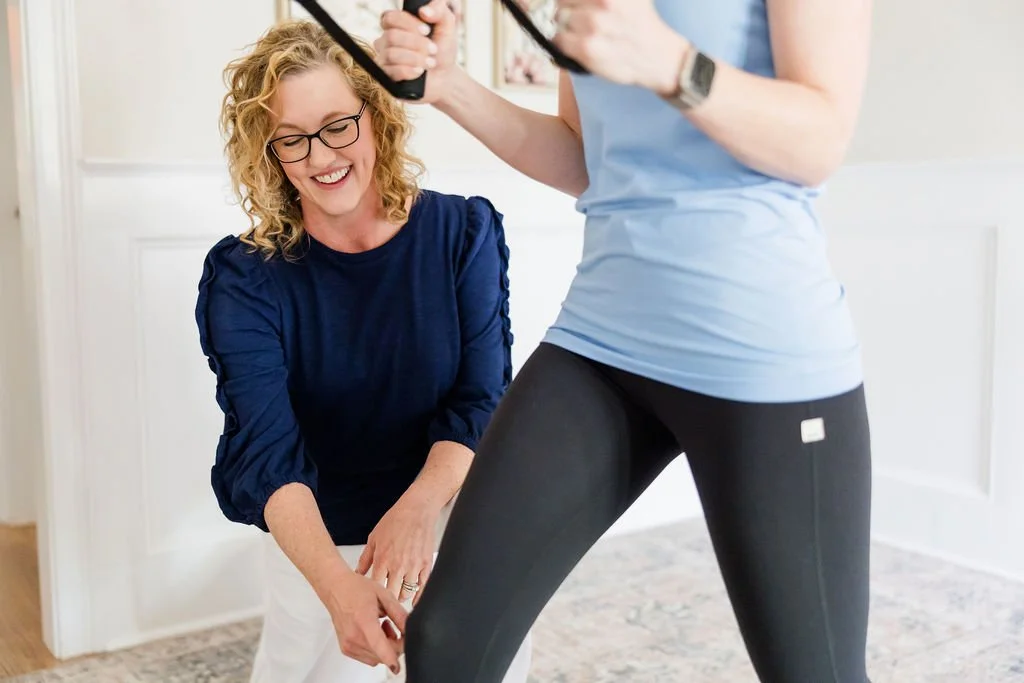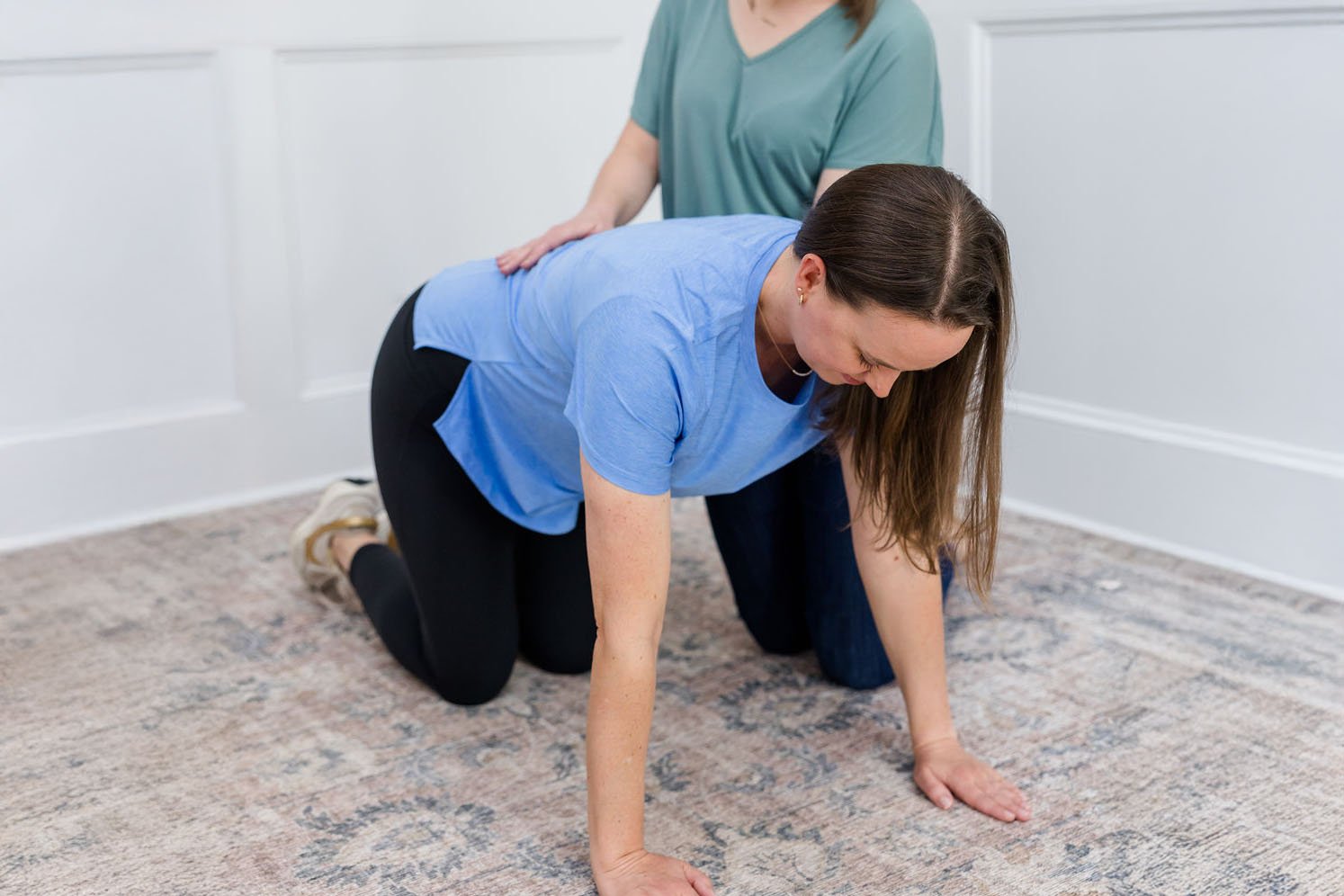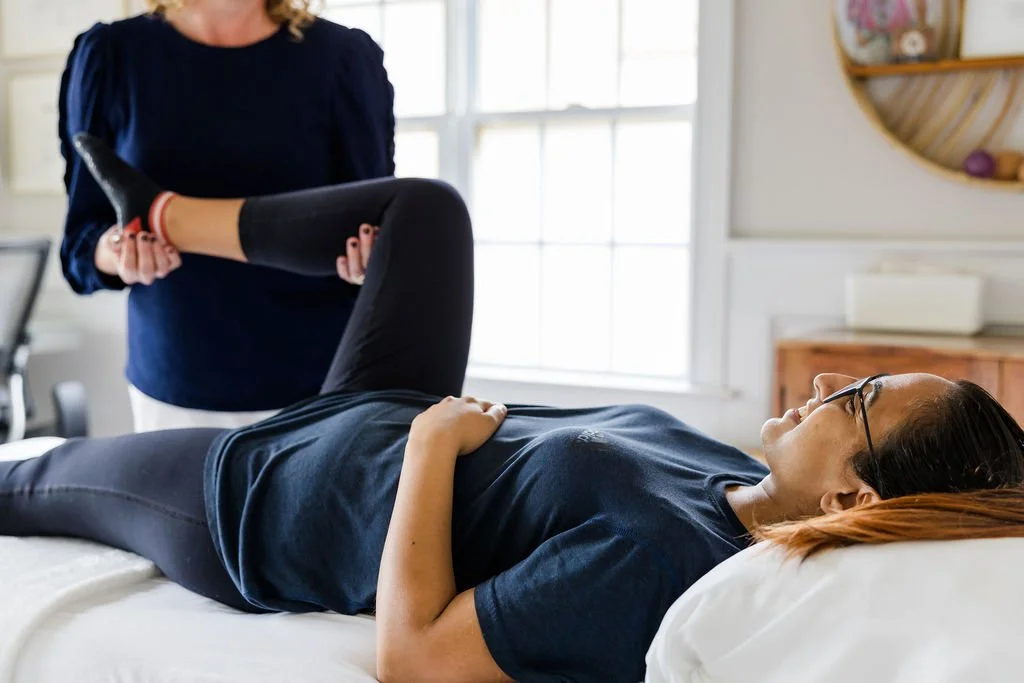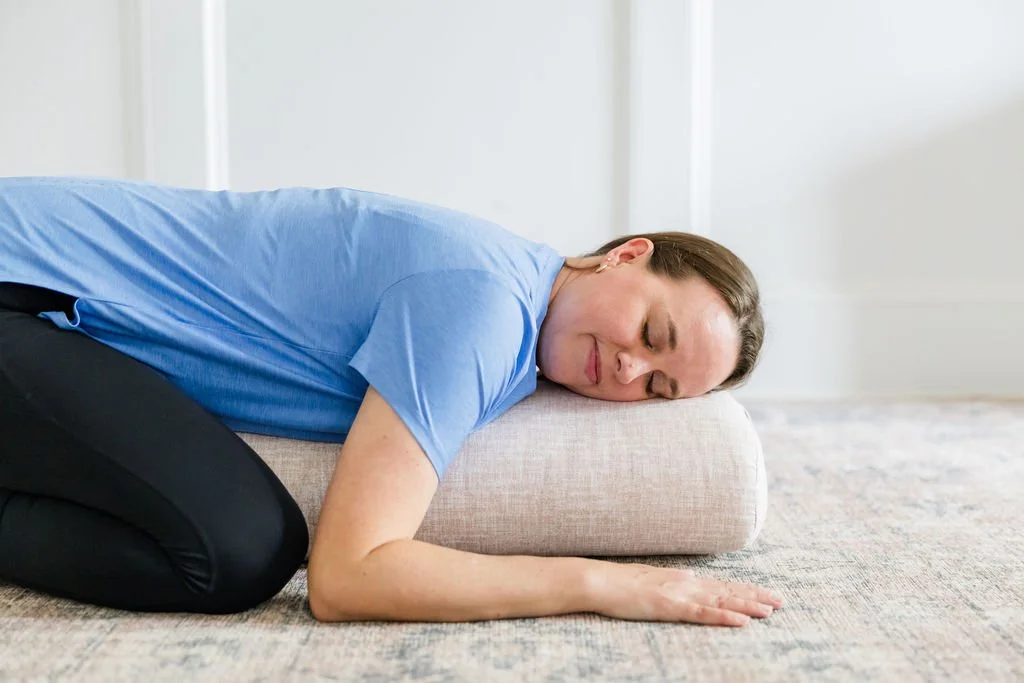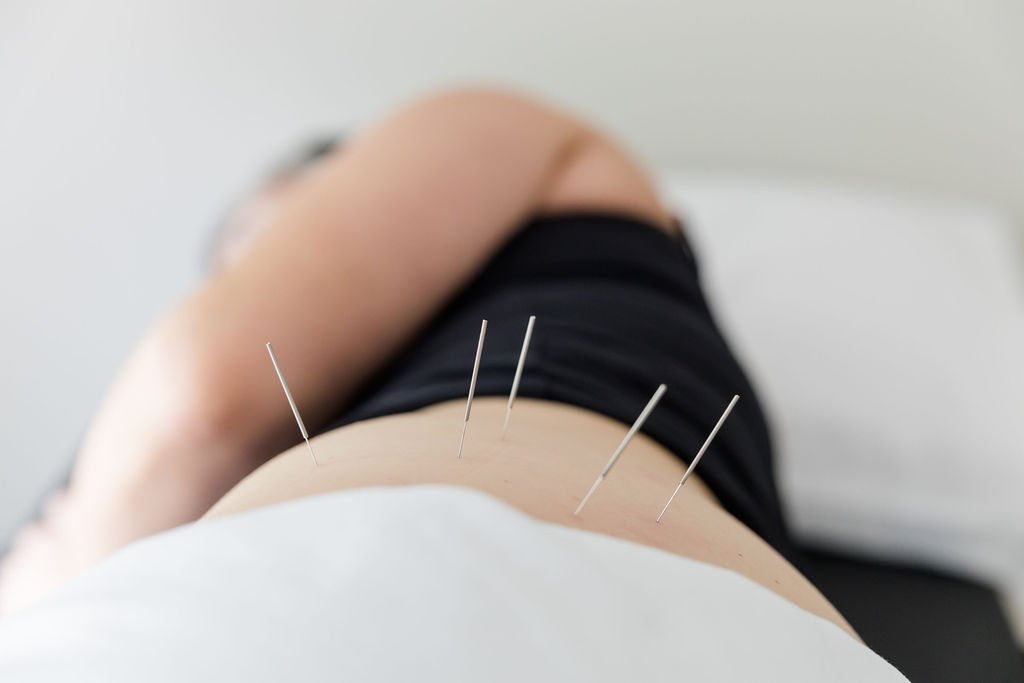Services
Bladder health
Bladder problems are so common, and they can have a huge impact on quality of life. The pelvic floor provides support for the bladder and closure of the urethra. The pelvic floor also needs to relax when the bladder is emptying. A pelvic PT can assess the way the core and pelvic floor respond to daily activities, whether it is overactive or underactive, and find solutions for improved bladder control.
We help women with the following symptoms: leakage (stress and/or urge incontinence), pain with bladder filling, pain with urination, a strong urge to urinate (urgency), urinating too often (frequency), bladder prolapse (cystocele), difficulty emptying the bladder, or difficulty starting the stream.
Bowel Health
The pelvic floor provides closure at the anorectal area to prevent passage of gas and stool, and it also needs to be able lengthen and relax to allow for passage of gas and stool. We help patients with the following symptoms and conditions: bowel leakage (fecal smearing or fecal incontinence), fecal urgency, constipation (outlet dysfunction), pain with defecation, anal fissures, dyssynergic defecation (incoordination), incomplete bowel emptying, rectocele, rectal prolapse, irritable bowel syndrome (IBS), and post-surgical conditions.
Orthopedics
Musculoskeletal pain that keeps coming back may need a more integrated treatment approach. The “core” area of the body - from chest to mid-thigh - can be part of that puzzle and will be included in examination of the whole body. Weakness / tightness after an old injury or surgery may restrict mobility in joints and/or surrounding fascia/muscles/nerves. This can lead to changes or patterns in the way you walk and move. Even poor postural habits or something like jaw clenching can contribute to problems further away in the body. People experiencing too much mobility in some joints often have recurrent pain and need to do specific corrective activities versus traditional stretching/strengthening exercises.
We help people experiencing the following symptoms: back pain, hip pain, groin pain, sacroiliac joint (SIJ) pain, knee pain, foot/ankle pain, shoulder pain, neck pain, pubic bone pain, sciatica, piriformis syndrome, general hypermobility, and chronic pain.
pelvic Pain
We understand how pelvic pain can limit normal life. Athens Pelvic PT is a safe place for healing and restoring function. We help women who are experiencing pain in their abdomen, hips, back, buttocks, tailbone, genitals, groin, vagina, vulva, rectum, pelvis, and pelvic floor. Some of the painful conditions we treat include: vaginismus, dyspareunia (painful or difficult sex), vulvodynia, pudendal neuralgia, endometriosis, proctalgia fugax, coccydynia, chronic pelvic pain, and interstitial cystitis / bladder pain syndrome.
Perimenopause / Menopause
Let’s start with a real, honest conversation about this transitional time. Many women struggle during perimenopause and menopause with pelvic floor dysfunction, genitourinary symptoms, sexual issues, changes in sleep patterns, gut health, and brain fog. Hormonal shifts during the transition affect so many systems of the body, including the musculoskeletal system. Loss of lean muscle mass and decreased bone density can occur, as well as ligament / tendon changes and joint inflammation that often leads to pain and stiffness.
We offer individualized support for women as they navigate through these years, offering guidance for pelvic floor symptoms, treatment for musculoskeletal pain that is affecting daily function, and progressive exercise plans to support muscle, bone and heart health. Staying functional as you age will mean you can do the things you want to do, engage in sports/activities, and meet others for social time.
Pregnancy / birth preparation
Our therapists are passionate about supporting women during this transformative time in their lives. Pregnancy is like a marathon for the body - it brings new demands on muscles, softening of ligaments, and postural changes. We help clients who are experiencing joint pain, muscle tension, incontinence, or fears about the birth experience.
As women prepare for birth, we assess breathing patterns, abdominals, hips, and the pelvic floor. Individual plans of care can include healthy movement, breathing activities, perineal massage, and recommendations for support garments or belts as needed. We also discuss the postpartum recovery period. We stay alongside women in the postpartum year, ensuring they are healing well and returning to full function.
Some of the conditions / symptoms we treat during pregnancy include: back pain, sacroiliac joint (SIJ) pain, pubis symphysis pain (SPD), bladder leakage or urgency, pelvic organ prolapse (POP), perineal pain, tailbone pain, sciatica, painful sex, bowel leakage or urgency, and constipation.
Postpartum
Pregnancy and birth affect the whole body, especially the core, including the abdominals and pelvic floor. Postpartum can mean just days following birth, or it can be decades after your delivery. We encourage all postpartum women to schedule a visit. For new moms, knowledge about their own body empowers them to make wise choices during the postpartum recovery period.
We help postpartum women with the following symptoms or conditions: diastasis recti abdominis (DRA), pelvic organ prolapse (POP), bladder or bowel leakage, core weakness, Cesarean scar pain or restrictions, perineal pain or scar restrictions, pelvic pain, low back pain, sciatica, pubis symphysis pain (SPD), sacroiliac joint (SIJ) pain, hip pain, constipation, rectal pain, anal sphincter injuries, and painful sex / changes in sexual function.
Pre- & Post-Surgical
Pelvic physical therapy can help patients prepare for upcoming abdominal or pelvic surgery by optimizing muscle function, coordination, and range of motion in a safe way. Learning correct techniques for lifting as well as correct defecation/elimination mechanics can help with complications following surgery. We can also help with post-operative care as healing occurs, including scar and fascial restrictions, appropriate mobility exercises, and pelvic floor / core retraining.
We treat women before / after the following surgeries: hysterectomy, bladder sling, pelvic reconstruction, prolapse repair, fistula repair, hernia repair, Cesarean births, endometriosis ablation/excision, abdominoplasty (tummy tuck), bowel resection, hemorrhoidectomy, and anal sphincter repair.
Prolapse
Prolapse is a loss of muscular and/or fascial support for the pelvic organs. Laxity in some of the soft tissues can lead to symptoms of pressure or heaviness in the vagina, or even seeing bulging tissue in the vagina or rectum. Women experiencing pelvic organ prolapse may also have a backache, lower abdominal pain, and difficulty emptying their bladder or bowels. We treat the following conditions: pelvic organ prolapse (POP) including anterior prolapse (cystocele or urethrocele), posterior prolapse (rectocele or enterocele), and apical prolapse (uterine or vaginal vault prolapse), rectal prolapse, as well as diastasis recti abdominis (DRA) and general hypermobility.
Wellness & Prevention
Nutrition, sleep, hydration, hormones, and stress all play a role in how your body heals and recovers. We understand the important integration of physical, mental, spiritual, and emotional health. Your daily habits, your social interactions, as well as your thoughts and feelings about situations can have a powerful effect on health. Moving toward wellness is an active process, and small steps can lead to big improvements over time. Although our time, motivations, abilities, and resources can change throughout the various stages in our lives, we can all find a way to get moving. As we renew our minds, with gratitude for our bodies, we take the next step towards health.
Some clients already have a healthy lifestyle and would like to schedule a ‘well’ visit to identify potential issues early. We are here to help you thrive, stay strong, and build resilience at any age or stage of life.
Some clients have tried regular exercise but have pain, mental health difficulties, or other symptoms that prevent them from moving forward. We are a safe space to help you get started, which is often the hardest part.
We value an interdisciplinary approach to care, and we refer our patients to other dedicated professionals who support wellness in our community.
How We Treat
Individualized treatment plans may include:
Manual therapy including soft tissue and myofascial techniques, visceral mobilization, neural mobilization, joint mobilization, muscle energy techniques, scar mobilization and desensitization — including intravaginal and/or intrarectal techniques
Pelvic floor / core retraining and progressive therapeutic exercises
Activities that promote mind-body connection and vagus nerve tone
Postural / pattern retraining and functional movements
Return to sport / higher level training
EMG biofeedback / electrical stimulation / hot or cold therapy
Dry needling
Cupping / taping
Education in lifestyle modifications to support pelvic health or general health / wellness
Self-care program including specific home exercises or activities to manage / prevent symptoms
Telehealth visits available

